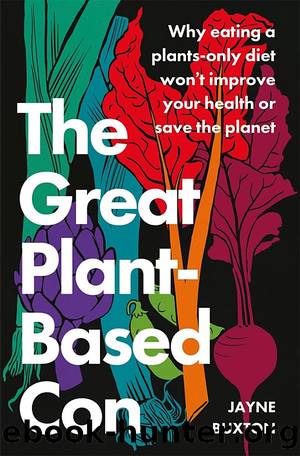The Great Plant-Based Con by Jayne Buxton

Author:Jayne Buxton
Language: eng
Format: epub
ISBN: 9780349427935
Publisher: Little, Brown Book Group
Bondevettâs concerns about the treatment of land and land use in the Poore model are best discussed in the next chapter. Suffice to say that he deemed the paperâs conclusions as conflicting âwith both common agricultural practices and their related emissions and climate impactâ.114
Bondevett was particularly critical of Poore and Nemecekâs use of the GWP100 metric for methane, which, he said, âgrossly overstates the warming impact of ruminantsâ. When methane is calculated using GWP* (as explained on page 245), the charts comparing GHGs from different foods look very different. Poore and Nemecek âignored all possibilities for accurate GHG accounting enabled by GWP*â.115
Frank Mitloehner echoes these concerns about the misuse of GWP metrics: âPoore and Springmann have used CO2e for methane and by doing so you assume that methane behaves in the same way to CO2, but it doesnât. The other thing they do is use global numbers to depict the impact of meat and dairy, because these are much larger . . . and they like to use the water footprint of beef but they are calculating rainwater as part of that footprint. That water goes into the grass, is eaten by the animals, and comes out as urine, [then goes] back into the grass. So they really distort the picture.â116
Richard Young of the Sustainable Food Trust has also criticised the Poore studyâs reductionist conclusions. He cites the observation that âthe highest impact 25 per cent of producers represent 65 per cent of the beef herdsâ GHG emissionsâ. A simplistic take on this observation would be to advocate the elimination of the â25 per cent of producers who are causing such a large part of the problemâ. But this simplistic conclusion would be entirely wrong, says Young: âThis 25 per cent of producers mostly live in dryland regions, such as sub-Saharan Africa: areas which often have very poor soil and low rainfall. As such their animals grow very slowly, but it is claimed, still produce a lot of methane because they have to eat very poor quality herbage. No doubt, people living in the Global South could reduce their carbon footprint from food significantly if they gave up meat and dairy, but they would also very quickly starve.â117 (They would starve because their land cannot be used to grow anything else. This challenge of using marginal land is something Iâll discuss in detail in the next chapter.)
Young also notes that the Poore and Nemecek study underestimates the carbon-sequestering potential of grasslands. Although their model is based on grassland offsetting a maximum of 22 per cent of emissions, âsince they cite no specific UK data in their study it is not clear whether this has any relevance to the UK or whether it is simply a global averageâ. Young maintains that âheavily stocked grasslands do have the potential to sequester more carbon if their management is improved, while all croplands could steadily regain carbon if they were converted to grass or to rotations including grass breaks. Since a third of soils
Download
This site does not store any files on its server. We only index and link to content provided by other sites. Please contact the content providers to delete copyright contents if any and email us, we'll remove relevant links or contents immediately.
Craft Beer for the Homebrewer by Michael Agnew(18222)
Marijuana Grower's Handbook by Ed Rosenthal(3663)
Barkskins by Annie Proulx(3355)
Project Animal Farm: An Accidental Journey into the Secret World of Farming and the Truth About Our Food by Sonia Faruqi(3208)
The Plant Messiah by Carlos Magdalena(2918)
Red Famine: Stalin's War on Ukraine by Anne Applebaum(2913)
0041152001443424520 .pdf by Unknown(2840)
Organic Mushroom Farming and Mycoremediation by Tradd Cotter(2681)
In the Woods by Tana French(2579)
Beer is proof God loves us by Charles W. Bamforth(2441)
7-14 Days by Noah Waters(2407)
Borders by unknow(2300)
Between Two Fires by Christopher Buehlman(2295)
Reservoir 13 by Jon McGregor(2291)
Meathooked by Marta Zaraska(2254)
The Art of Making Gelato by Morgan Morano(2245)
Birds, Beasts and Relatives by Gerald Durrell(2210)
The 7 Habits of Highly Effective People: Powerful Lessons in Personal Change (25th Anniversary Edition) by Covey Stephen R(2183)
The Lean Farm Guide to Growing Vegetables: More In-Depth Lean Techniques for Efficient Organic Production by Ben Hartman(2123)
